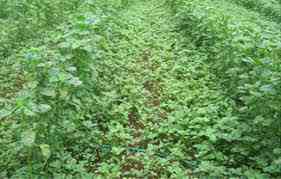Jihan Annisa1, Aurel Aulia Rahmadani1, Nadira Virgin Al-Qomar1, Rodifah Royan1, Sholeh Hafish A.F1, Fatimatus Zahro1
1 Program Studi Kedokteran Hewan, Fakultas Ilmu Kesehatan, Kedokteran dan Ilmu Alam
Abstrak
Penelitian ini bertujuan untuk menguji efektivitas pemberian filtrat bayam cabut (Amaranthus tricolor) terhadap jumlah eritrosit pada mencit putih (Mus musculus). Bayam cabut dikenal memiliki kandungan zat besi dan senyawa bioaktif seperti flavonoid dan vitamin C yang berpotensi meningkatkan hematopoiesis. Penelitian dilakukan dengan metode eksperimental menggunakan Rancangan Acak Lengkap (RAL). Sebanyak lima ekor mencit putih dibagi menjadi kelompok kontrol dan perlakuan dengan dosis filtrat bayam cabut sebanyak 0,1 ml, 0,2 ml, dan 0,3 ml yang diberikan secara peroral selama 9 hari. Jumlah eritrosit diukur menggunakan alat Hematologi Analyzer setelah perlakuan selesai. Hasil penelitian menunjukkan bahwa kelompok dengan dosis 0,2 ml dan 0,3 ml mengalami peningkatan jumlah eritrosit yang signifikan dibandingkan dengan kelompok kontrol dan dosis 0,1 ml. Rata-rata jumlah eritrosit tertinggi diperoleh pada kelompok dosis 0,3 ml (9,64 10/L) diikuti dosis 0,2 ml (9,61 10/L). Sementara itu, dosis rendah (0,1 ml) menunjukkan penurunan jumlah eritrosit dibandingkan dengan kelompok kontrol. Peningkatan ini diduga karena kandungan zat besi dan senyawa bioaktif dalam bayam cabut yang mendukung produksi hemoglobin dan sel darah merah. Penelitian ini menyimpulkan bahwa pemberian filtrat bayam cabut efektif meningkatkan jumlah eritrosit pada mencit putih, terutama pada dosis yang lebih tinggi.
Kata kunci: Bayam Cabut (Amaranthus tricolor), Eritrosit, Mencit Putih, Hematopoiesis, Zat Besi.
Abstract
This study aims to test the effectiveness of giving spinach filtrate (Amaranthus tricolor) on the number of erythrocytes in white mice (Mus musculus). Spinach is known to contain iron and bioactive compounds such as flavonoids and vitamin C which have the potential to increase hematopoiesis. The study was conducted using an experimental method using a Completely Randomized Design (CRD). A total of five white mice were divided into control and treatment groups with doses of spinach filtrate of 0.1 ml, 0.2 ml, and 0.3 ml given orally for 9 days. The number of erythrocytes was measured using a Hematology Analyzer after the treatment was completed. The results showed that the groups with doses of 0.2 ml and 0.3 ml experienced a significant increase in the number of erythrocytes compared to the control group and the dose of 0.1 ml. The highest average number of erythrocytes was obtained in the 0.3 ml dose group (9.64 10/L) followed by the 0.2 ml dose (9.61 10/L). Meanwhile, the low dose (0.1 ml) showed a decrease in the number of erythrocytes compared to the control group. This increase is thought to be due to the iron content and bioactive compounds in spinach that support the production of hemoglobin and red blood cells. This study concluded that administration of spinach filtrate effectively increased the number of erythrocytes in white mice, especially at higher doses.
Keywords: Spinach (Amaranthus tricolor), Erythrocytes, White Mice, Hematopoiesis, Iron.
Pendahuluan












